Policing Tourist Areas: Working Where Others Play
Law enforcement officers who work in tourism towns have a two-fold mission, protecting the locals and protecting the droves of tourists that the locals depend upon for their livelihood and their departments depend upon for operating funds. That may sound crass but law enforcement agencies in destination areas have to be aware of the numbers and what they mean.

American tourism is big business. In one month international visitors to the United States can spend more than $15.4 billion. And that's expected to rise. The National Travel and Tourism Strategy, launched in 2012, was created to draw 100 million international visitors to the U.S. by 2021 with hopes of having them spend $250 billion annually. And that's just international visitors. Your fellow Americans are also traveling to U.S. tourist sites and opening wide their wallets.
Destination areas have two populations: the year-round locals and the visitors. A small beach town of 50,000 can swell to 10 times that size during the summer. The agency serving that town has to have resources and personnel well beyond what it could afford if its budget were based on the local tax base. So tourism dollars are the life's blood for such an agency.
To keep the tourism dollars flowing, destination area officers must ensure that both the visitors and the locals are safe and secure, all while maintaining the fun and friendly atmosphere that attracts people to the area. Officers in tourism areas have to be adept at crime prevention, crime response, and crime fighting, all while keeping smiles on their faces.
The following is a look at what it's like to work some of the nation's busiest playgrounds.
Out on I-Drive
The Orange County (Fla.) Sheriff's Office has one of the nation's most enviable and challenging tourism jurisdictions, including Walt Disney World, Universal Studios, and all of the other theme parks and tourist attractions just outside of Orlando.
Capt. Gil McDaniel says he and the other officers of the Orange County SO must always be aware that their job is to protect and serve not only the locals, but the area's 56 million visitors per year, including presidential candidates, foreign dignitaries, and celebrities.
Working the International Drive corridor (I-Drive in local parlance), which is lined with theme parks, hotels, restaurants, and one of the nation's largest convention centers, McDaniel oversees 76 deputies who are supported by tactical and mounted patrol units and traffic and motorcycle squads. "Overall this is one of the safest places on Earth. Our crimes are crimes of opportunities. The biggest thorn in my side is car burglaries," he says.
McDaniel believes that people have a tendency to forget basic street smarts when they arrive in Orlando. "On vacation, you're here to unwind and have fun, you're drinking in all the beauty and the cool stuff you see, and so you might not be on your guard so much," he says. "You might be shopping at Coach and then stick your bags in your car seat where anyone walking by can see, and not lock your door."
Hotel burglaries tend to be another crime of opportunity against unwary tourists. McDaniel says tourists sometimes prop open their hotel room doors because one of their kids has the room key down at the pool. Other tourists might leave say a computer tablet in the business center when they use the restroom, and when they return, it's gone, along with a wealth of personal information.
The theft of personal information and identity fraud is a growing problem in America's tourist areas, and McDaniel says these scammers like to hit travelers when they are most vulnerable. He explains how "pizza flyer guys" will slip a flyer under a tourist's door offering great prices for credit card purchase and then, after a long day of sightseeing, that tourist will come back to the room and order the $12.99 large pepperoni. The scammers now have the tourist's credit card number, and the tourist never even gets a pizza.
Orange County SO has forged a community-driven strategy to combat crimes against tourists. As part of this strategy, officers are encouraged to take the time to have friendly chats with residents, tourists, business owners, and security from the theme parks like Sea World. "We are grippin' and greetin,' meeting people," McDaniel says. He explains that Orange County SO deputies might take a picture with a kid or talk with hotel security, but they're working—even if it just looks like they're chatting. Through all this grippin' and greetin' Orange County SO deputies are actually building relationships and pushing the Sheriff's message of "if you see something, say something," according to McDaniel.
But community policing and tips are just one part of Orange County SO's crime prevention effort. Another major element of the agency's strategy is identifying hot spots using Compstat.
"Every morning on my phone, I get stats on my district…and direct resources to it. It's like insider trading. Now we're getting [stats] in real time, so we're always on it," McDaniel says. He explains that the agency uses Compstat to map patterns and uses this data to "find, fix, and arrest" the perpetrators.
Enforcing the law in a tourist area requires a different way of policing, McDaniel confirms. "With all these heads and beds, we need all of these hotel rooms to be full and these people eating in restaurants because the tourist core is our economic core."
How does that translate to policing? "If I stop a resident in traffic…they know the laws and should know better, so they'll probably get a ticket. But if one of our officers sees someone who is driving strangely and stops that person and finds he is from Europe in a rental car, having trouble driving on the right side of the road or lost, that officer is likely to be more sympathetic and correct the behavior."
Says McDaniel: "At the end of the day it's customer service. Some deputies don't like when I say this, but we protect and serve our customers. They don't need John Wayne chewing on a toothpick. They need someone better, more polished…if you're unprofessional, yelling at people…you're affecting everyone in this county. You may be the only contact this tourist has with Americans. They may have saved up for five years to go on this vacation with their five kids."
It's a Small World
Across the country in another Orange County, the Anaheim (Calif.) Police Department patrols another theme park corridor, including the granddaddy of them all, Disneyland.
"We don't see an increase in crime as a result of having resort areas," says Lt. Bob Dunn, Anaheim PD's public information officer. He explains the department's strategy to prevent crimes against both locals and tourists is to build networks and promote communication with all elements of the community.
"The more we visit and engage with people and let them know what would make them a victim, the more we see it does prevent [crime]," Dunn says.
The Anaheim PD produces a PSA of safety tips and has worked with hotels to place it on the guest TV channel. The department is active on social media, too. And it trains "Resort Ambassadors," volunteer foot patrols that provide directions and act as an information source.
Anaheim PD has found partnerships to be a crucial part of its public safety strategy. These partnerships include working with Disney security, other theme park personnel, hotel staff, and other key players. The agency also keeps up with best practices at tourism policing conferences, and has helped businesses set up a Crime Alert Network. The network lets participants share information about various criminal activities; for example, someone stealing credit cards.
And like its counterpart in Orange County, Fla., the Anaheim PD boasts a robust crime analysis unit that spots trends such as analyzing repeat 911 call locations. "Every week we have a crime meeting where we study calls for service," Dunn says. "We have conversations about the best approaches to this information, how to get it solved, how to prevent it."
Edge of the Smokies
Gatlinburg, Tenn., Police Chief Randy Brackins agrees policing tourist areas requires a bit more finesse than policing other locations. "It's definitely different from normal policing," he says. "We have to be very hospitable."
Gatlinburg's population is 4,100, but overnight in peak season it swells to anywhere from 45,000 to 65,000. The Fourth of July parade, which starts the night of July 3, draws 60,000 to 80,000 folks to the town's sidewalks.
Like Orange County SO's McDaniel, Brackins says tourists can find themselves victims by not being cautious. "Maybe they've had an extra drink or two, and they're walking around town more relaxed, not on guard as much. They get caught up in visiting shops and don't pay as much attention," he explains.
While Gatlinburg has some theft from visitors leaving behind cell phones or cameras, Brackins say his main problem is bottlenecked traffic through town, as route 441 leads into Great Smoky Mountains National Park. Gatlinburg uses walking patrols and bicycle patrols on the "packed" sidewalks.
"We have as many officers out there as we can see," Brackins says. In peak season, they overlap a 10-hour shift. "Our goal is to reduce crime and have a higher quality of visitor experience. If they're safe and feel good, they see officers around, they have a better vacation and feel at ease. It makes them want to come back. We want you (our visitors) to just be yourself and not worry about crime…we have to worry about crime."
Brackins says partnerships are key to crime prevention in tourism areas. His officers regularly meet with the Gatlinburg Merchants Association and have established a notification system that lets them alert officers to specific concerns such as "counterfeit 20s or suspicious persons."
Falling Water
Head north of Buffalo, N.Y., and across the Canadian border and you will see 6 million cubic feet of water gushing every minute. You'll also meet officers who understand what it takes to police a tourist area.
"It is unique, different from policing any other area," reports Staff Sgt. Brian Ash of the Niagara Regional Police Service in Ontario, Canada. Ash says his region has quadrupled in population over the past 15 years. The region covers two casinos, a large convention center, and 100,000 hotel rooms. And, like the Gatlinburg area, the region's population balloons from May to Labor Day and during special events (like when Nik Wallenda walks across the Falls on a tightrope.)
Policing in the Niagara region can be different because it is transient for victims—and for criminals. The bad guys come to the area, which is target rich—and move on. Their primary source of criminal income while in the Niagara region is vehicle burglary and vehicle theft.
"Tourists are more likely to have valuables on them or in their vehicles, more money, more belongings….and there's so many vehicles available [in parking lots]. So the thieves can find high-end vehicles they're interested in stealing," Ash says.
Besides lost or stolen property, including passports, the casino district has alcohol-related calls, bar fights, and hotel evictions, particularly when hotels rent at a lower rate in the off season. The police also track crime data through an analyst and learn if certain parking lots of a hotel are hit at certain hours.
"We're out there with proactive things; we stay ahead of it with a higher visibility plan to be in those parking lots and do covert things, too," Ash says. "We'll put an undercover in, and someone may end up stealing from the wrong vehicle."
Fighting Back
"The bad guys are looking through binoculars at lost tourists, and they see easy pickings," says Dr. Ken Peak, a professor of criminal justice at the University of Nevada Reno, co-author of the 2004 Department of Justice guide "Crimes Against Tourists" and author of 30 law enforcement books. "So there are obvious venues, special events, sites that are magnets for people. It's like the 'Vacation' movies with Chevy Chase. People get in a rental car, there's poor signage, and before you know it they're lost and can be a target."
Peak, a former police officer, believes the answer to crime in tourism area is technology such as Compstat and predictive policing, not dummy cameras or empty police cars. He says crime can be subtle, not on the radar screen. You're not aware until you get a cluster. "We have to be able to identify crimes against the tourists and act against them. Because individual police retire, forget, but computers remember."
All departments contacted for this article told POLICE they analyze data but don't keep tourism crime statistics.
So maybe the best approach to policing in a tourist area was voiced by Orange County SO's McDaniel. "Get out of your car. Go meet people. You know the old adage 'It takes a village to raise a child'?" he asks. "Well it takes a village to police it. You can't rely on a cop in a car anymore. We must share information and come together. It works this way. Everyone pitches in, they help us, we help them."
Kristine Meldrum Denholm is an award-winning freelance journalist based in Washington, D.C., and a frequent contributor to POLICE . She wrote for ATF's press office for 10 years.
Williamsburg: Policing Where the Present Meets the Past


Maximizing Fleet Efficiency and Accountability with Traka Key Management Solutions

SPECIAL REPORT: Officer Health & Safety

Forecasting the Future: Trends and Predictions for Law Enforcement in 2024 and Beyond

Staying Ahead of the Curve: Navigating Emerging Drugs for Law Enforcement
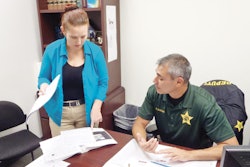
Dealing with Confirmation Bias
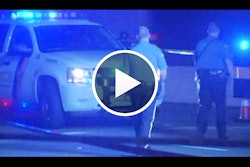
Video: Tractor-Trailer Rear-Ends Patrol Car, New Jersey Officer Killed

Video: Hostage, 2 Bank Robbery Suspects Killed in Gun Battle After Police Chase
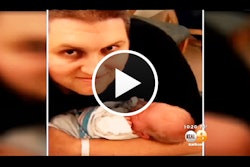
Video: On-Duty California Officer Delivers His Own Son
Minnesota deputy shot, suspect dead in warrant service shooting, woman sentenced to life in prison for stabbing florida deputy, fbi warns about increased risk of foreign terrorists targeting u.s., small explosive device exposes florida deputy to white powder during traffic stop, guest editorial: the border mess is endangering police nationwide, virginia investigator honored as national deputy of the year.
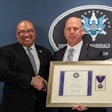
21-Year-Old Alabama Deputy Dies from Crash Injuries
Suspect fleeing washington officers drives wrong way on interstate, crashes.
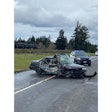
Alabama Deputy Critically Injured in Single Vehicle Duty Crash
Milwaukee officer struck by police vehicle during pursuit, suspects in murder of nypd officer indicted, phoenix officer shot multiple times at off-duty assignment.

How important is a Tourist Police unit in Africa?
Anugwolu Timothy
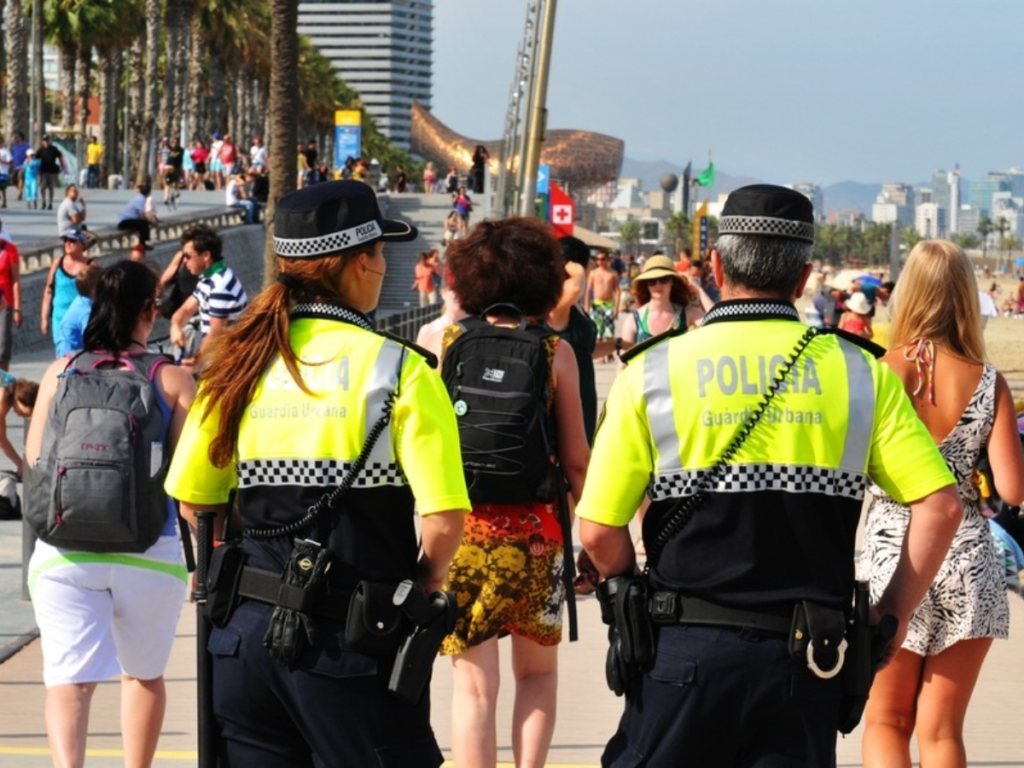
Tourism is a critical revenue source for many countries. As of 2019 , tourism was recorded to contribute 10.3 per cent to the global GDP (US$9.6 trillion) . Although that figure has reduced marginally since then, it is clear that tourism continues to be one of the world’s largest sectors.
The safety and security of tourists should be a matter of concern because any real or perceived insecurity can destroy a tourism destination’s reputation. For the purpose of providing safety and security to tourists, it is important for countries in Africa to consider setting up tourist police units.
Specialist tourist police services are currently operating in Australia, Thailand, Malaysia, Greece, Jordan, Brazil, The Philippines, London, USA, Greece, South Korea, Russia, Libya, Nepal, Sri Lanka, Argentina, Dominican Republic, Costa Rica, Peru, Vietnam and several other countries across the globe.
In Africa, Egypt, Kenya and Uganda are some of the countries that have a dedicated police unit for tourism safety and security. How have these countries found this helpful so far?
Advantages of a Police Tourism Safety Unit
1. it helps to prevent crime : .
A Police Tourism Safety Unit can help prevent crime by patrolling tourist areas and deterring criminal activity. This can help reduce the incidence of crime in tourist destinations and make them more attractive to tourists. Let’s talk about the story of Waza National Park in Cameroon .
In 2013, the park had about 4,000 visitors. As of 2022, the number of visitors was less than 300. What caused this drastic decrease, you may wonder? The region shares a border with Chad and Northern Nigeria, and has faced terrorist threats. No doubt, effective policing is of paramount importance for tourism destinations.
2. It ensures the safety of tourists :
One of the primary responsibilities of a Police Tourism Safety Unit is to ensure the safety and security of tourists. They also respond to emergencies and provide support to tourists who require it.
In countries such as Egypt, tourist police officers are trained to interact with tourists, assist with directions and also provide insights about the country’s tourism products. These officers also educate foreign tourists on the laws they are expected to abide by.
This is one of the reasons why the South African Department of Tourism has set plans in motion to establish a dedicated police tourism unit . On a smaller scale, they have engaged the local youths and stationed them at different tourist attractions as safety observers. With a dedicated police safety unit, that arrangement will look a lot more professional and assuring.
3. It enhances the reputation of a tourist destination :
Tourists are more likely to visit a destination that is known to be safe and secure. A Police Tourism Safety Unit can help enhance the reputation of a tourist destination by ensuring that tourists feel safe and comfortable while visiting.
In 2022, Egypt had 11.7 million tourists . If tourist security is effective, it can be a powerful marketing tool to attract people to your hotels, destinations, or communities.
Is it possible to implement this locally (in Nigeria)?
Law enforcement has been an issue in Nigeria recently, so a dedicated Police Tourism Safety Unit can help build trust and positive relationships between law enforcement and tourists. They know who to trust and who is on their side.
With that in mind, it is natural to admit that such jobs may not be appropriate for everyone. These officers need to be people with high degrees of tolerance and civility. On the other hand, these officers should be paid the same wages as their counterparts.
There should be no internal discrimination and officers should be allowed a chance at career progression.
Granted, like almost every public sector, resources in the Police Civil Service are stretched thin. However, if we want to develop tourism policies for sustainable and inclusive growth, a dedicated police tourism safety unit should be given more consideration.
Further Reading: Tourism-Oriented Policing and Protection Services
Recent Posts
Read now – the business of tourism: fuel subsidy implications for the nigerian hospitality, travel and tourism industry, recommendations for nigeria’s hospitality, travel and tourism industry, fuel subsidy removal’s impact on travel, tourism, and hospitality in nigeria, boosting tourism numbers post-covid – lessons from tanzania, how practicable is a tourist tax in africa, read more on hospitality, travel and tourism., leave a reply cancel reply.
Your email address will not be published. Required fields are marked *
Post Comment
- First Name *
- Email Address *
- Published Report
- From a friend/colleague
- Email This field is for validation purposes and should be left unchanged.

- Publications
To provide feedback on the Community Policing Dispatch, e-mail the editorial board at [email protected] .
To obtain details on COPS Office programs, publications, and resources, contact the COPS Office Response Center at 800-421-6770 or [email protected]

Small Towns, Big Crowds: Policing Tourist Destinations
August 2019 | Volume 12 | Issue 7
Tourists do the darndest things: leave hotel room doors propped open, wade into traffic with eyes fixed on cell phones, and climb lamp posts to take selfies, to name a few. They sometimes feel as if local laws and safety precautions don’t apply when they’re on holiday. Or, as one police chief remarked, “Some leave their brains at home when they go on vacation.”

All of this can make policing tourist destinations challenging—especially in small towns, such as beach or mountain resorts, whose populations may grow ten- or even hundredfold in peak season. Dealing with the additional load on their services and personnel may not be easy, but many local departments have found ways to keep both visitors and community safe and happy while not breaking the bank.
Extra Eyes and Ears for the Force

Community policing is especially important in these destinations, where police rely on hotel clerks, bartenders, boutique owners, and others who are on the front line of the tourist scene to be their eyes and ears. In Sturgis, South Dakota, which holds a ten day motorcycle rally and music festival that attracts around 500,000 additional people to the town of 7,000 every July, Police Chief Geody VanDewater holds a pre-rally meeting with bars and liquor establishments.
“I want to have working relationships with these individuals so that if I have issues, or they do, we have direct contact with each other,” he says. There have been shootings in these bars, and their staff have helped the department by giving statements. They have their own security, but rely on us to remove intoxicated and unruly patrons.”
”Community policing is important to us in other ways too,” VanDewater adds. “We encourage our officers to have friendly interaction with tourists as well as locals, and they do interact, chatting and taking pictures with people. They enjoy doing it too because pretty much everybody is friendly during the rally.”
Internships for Seasonal Officers

Class One Special Law Enforcement Officers (SLEO I) are trained and empowered to issue summonses for parking and local ordinance enforcement, and for minor incidents such as disorderly behavior, but they do not carry a firearm. While employed, Class Two Seasonal Law Enforcement Officers (SLEO II) have the authority and arrest powers of fulltime police officers, and they carry a firearm. Most SLEOs are studying criminal justice and all get credit for the internship from their colleges.
Off Duty Cops and Safety Ambassadors
The Sturgis Police Department usually hires 15 volunteer officers, who come in from all over the country to work full-time during the rally. Some are employed by other agencies and take leave to do this; others are retired. According to Chief VanDewater, they come for the camaraderie. “One guy has been doing this for 41 years,” he says. “To recruit, we put the word out through emails, in social media, and in local fusion centers. We outfit them with grey polo shirts and feed them, but they work for the fun of it.”
Though they are not employees of the Grand Rapids (Michigan) Police Department , Safety Ambassadors hired by Downtown Grand Rapids, Inc. and managed by the Block by Block Company are assets to the department. Block by Block provides safety, cleaning, and outreach services to downtown improvement districts in customizable programs, which Grand Rapids adapted to their public safety needs.
Many of their Ambassadors receive training in skills such as physical and mental health first aid, treating drug overdoses, and spotting sex trafficking. Though not trained to intervene in crime, they have been credited with stopping a potential burglary and a domestic abuse situation. Just as importantly, they know how to be good witnesses and call the police for assistance or to report a crime. According to Rebecca Krenz, Operations Manager of the Downtown Grand Rapids Ambassador Program , “We're feet on the streets and often first on the scene when things happen.”
Recruitment and Housing Options

Yet recruitment isn’t always easy, even in desirable vacation locations. A big obstacle is housing. The Ocean City (Maryland) Police Departmental Housing Program leases homes, which they sublease at cost to seasonal employees. They also have a Housing Alternatives List, with contact information for departmental officers, officers from other agencies, and friends of the department with houses or rooms for rent. Another option is their Facebook group, where seasonal employees can discuss housing and find roommates.
Sources for Financial Support

There are additional sources for funding as well. Chief Marino of the Cape May Police Department suggests trying foundations supported by various companies. “The WaWa Foundation , which supports a Heroes Award, provided funding for load bearing vests for our officers, to lessen the load on their duty belts, which can cause back programs. Companies like that may fund other needs. It may be possible to find someone in the community to do research and writing for grant funding.”
In some cities and larger resort destinations, tourist boards fund law enforcement efforts to maintain public safety. According to a June 4, 2018 article in the Tennessean newspaper, the Nashville Convention and Visitors Corp provides its city police department with an annual grant of $100,000 to ensure tourist safety, and also pays for police overtime at special events.
In Nevada, the Las Vegas Convention and Visitors Authority funds an analyst at the Las Vegas Metro Police Department’s Southern Nevada Counter Terrorism Center who is responsible for sharing safety information from the police department with the tourism community, and acts as a liaison between event producers, resort partners, and local public safety agencies. 1
The Bottom Line
Tourism is a growing source of employment and revenue throughout our country. According to the U.S. Travel Association , direct spending by domestic and international travelers in the U.S. averaged $3 billion a day for a total of $1.1 trillion in 2018. According to the association’s Travel Impact Calculator , the economic impact of a 4.95 percent increase in 2019 travel spending could result in almost $4 billion in additional state and local tax revenues, which could fund the hiring of an additional 60,300 American law enforcement officers.
What’s more, the benefits of tourism extend beyond the revenue, to the interactions that all members of the community, including law enforcement officers, have with people from all over the U.S. and the world. Like other members of the community, the men and women in blue are ambassadors for their towns and for our country, and their contacts with travelers can leave a positive lasting impression.
Tourism will continue to pose challenges as it grows, but creative approaches to meeting them will open new opportunities for relationships and collaboration within and outside of their community—a win-win for everybody.
Faye Elkins Sr. Technical Writer
Sources for More Information
Planning and Managing Security for Major Special Events: Training Curricula Planning and Managing Security for Major Special Events: Guidelines for Law Enforcement
References: 1. https://skift.com/2018/07/16/tourism-boards-offer-funding-to-city-police-departments-to-boost-security/
Resources for Further Reading
Effects of the Hypervigilance Biological Rollercoaster
2. Fox, J., Desai, M.M., Britten, K., Lucas, G., Luneau, R., & Rosenthal, M.S. (2012). Mental-Health Conditions, Barriers to Care, and Productivity Loss Among Officers in An Urban Police Department. Connecticut Medicine , 76 (9): 525-531.
Subscribe to Email Updates
To sign up for monthly updates or to access your subscriber preferences, please enter your email address in the Subscribe box.

The Community Policing Dispatch is the e-newsletter of the COPS Office.
- LE Spotlight
Connect With Us
Want to stay connected with the COPS office? Follow us on social media!

- No FEAR Act
- Open Government
- Plain Writing
- Legal Policies and Disclaimers
- Language Access Plan
- DOJ Privacy Policy
To read this content please select one of the options below:
Please note you do not have access to teaching notes, role of tourism policing to improve tourist destination image.
Overtourism as Destination Risk
ISBN : 978-1-83909-707-2 , eISBN : 978-1-83909-706-5
Publication date: 13 May 2021
Tourism is one of the fastest growing sectors and plays a key role for the economy of various countries. Tourism sector provides lot of opportunities and challenges to its stakeholders. Tourist's safety and security plays a vital role to increase the tourists to a location. Tourism policing plays an essential role to build destination image. Governments are making many efforts through tourism policing to protect the safety and security of the domestic and foreign tourist and also to handle overtourism and enhance responsible tourism. This paper analyses the importance of tourism policing to attract more tourists and its impact on tourist destination image building.
- Overtourism
- Tourism policing
- Tourism marketing
- Destination image
- Tourist safety
- Responsible tourism
Ganesan, M. and Athimuthu, R. (2021), "Role of Tourism Policing to Improve Tourist Destination Image", Sharma, A. and Hassan, A. (Ed.) Overtourism as Destination Risk ( Tourism Security-Safety and Post Conflict Destinations ), Emerald Publishing Limited, Leeds, pp. 187-199. https://doi.org/10.1108/978-1-83909-706-520211013
Emerald Publishing Limited
Copyright © 2021 by Emerald Publishing Limited
We’re listening — tell us what you think
Something didn’t work….
Report bugs here
All feedback is valuable
Please share your general feedback
Join us on our journey
Platform update page.
Visit emeraldpublishing.com/platformupdate to discover the latest news and updates

Questions & More Information
Answers to the most commonly asked questions here
Tourism Security in a Post-COVID-19 World: Issues of Tourism Policing and Civil Unrest
- First Online: 30 November 2021
Cite this chapter
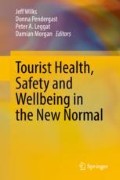
- Peter Tarlow ORCID: orcid.org/0000-0001-7792-7427 5
644 Accesses
3 Citations
The COVID-19 pandemic has created new and challenging issues for tourism policing. Prior to COVID-19 tourism policing dealt with issues such as criminality and terrorism. Few police departments saw public health issues as part of their mandate, nor were most of their officials experts in pandemics and the interaction between health issues and tourism security. As the reader will see in this chapter, COVID-19 added a new layer to the role of the tourism security official. Not only were health regulations a part of the travel industry, but their flaunting became a crime committed by members of the tourism industry and their guests. Secondly, tourism security professionals also fell victim to the pandemic and had to care not only for the industry and its visitor’s health but also had their own families about which to worry. This chapter examines how tourism policing around the world faced new challenges and how the intersection of security and public health has changed, perhaps forever, the fundamentals of tourism policing.
This is a preview of subscription content, log in via an institution to check access.
Access this chapter
- Available as PDF
- Read on any device
- Instant download
- Own it forever
- Available as EPUB and PDF
- Compact, lightweight edition
- Dispatched in 3 to 5 business days
- Free shipping worldwide - see info
- Durable hardcover edition
Tax calculation will be finalised at checkout
Purchases are for personal use only
Institutional subscriptions
Amazing Thailand. (2020). Tourist police . https://www.amazing-thailand.com/thai-tourist-police.html
Amnesty International. (2019, September 19). Hong Kong: Arbitrary arrests, brutal beatings and torture in police detention revealed . https://www.amnesty.org/en/latest/news/2019/09/hong-kong-arbitrary-arrests-brutal-beatings-and-torture-in-police-detention-revealed/
Bambo, L. (2021, February 3). Is Cape Town safe for travel in 2021? https://www.thebrokebackpacker.com/is-cape-town-safe/
Bartlett appoints New Director of Visitor Safety and Experience to further Review Security Audit Report. (2019). Ministry of tourism. https://www.mot.gov.jm/news-releases/bartlett-appoints-new-director-visitor-safety-and-experience-further-review-security
Bates, J. (2020, April 2). Police departments, sheriffs’ offices across the U.S. grapple with COVID-19’s impact on public safety—And their own. TIME . https://time.com/5812833/coronavirus-police-departments/
Beer, T. (2020, June 12). Minneapolis City Council unanimously votes to replace police with community-led model. Forbes . https://www.forbes.com/sites/tommybeer/2020/06/12/minneapolis-city-council-unanimously-votes-to-replace-police-with-community-led-model/?sh=3edcda6e71a5
Bianchi, R. (2006). Tourism and the globalisation of fear: Analysing the politics of risk and (in)security in global travel. Tourism and Hospitality Research, 7 (1), 64–74. https://doi.org/10.1057/palgrave.thr.6050028
Article Google Scholar
Booker, J. (2007, August 7). ‘Tourist police’ touted for tourism hotspots. New Zealand Herald. https://www.nzherald.co.nz/nz/tourist-police-touted-for-visitor-hotspots/PMPCHNDPIQ3S5I2DTCSKMXZEN4/
Busch, D. M., Tanafor, M. G., & Feng, A. (2020, May 20). Part four of the COVID-19 roadmap series: Ensuring a safe workplace—reimagining the physical workspace and business travel. National Law Review . https://www.natlawreview.com/article/part-four-covid-19-roadmap-series-ensuring-safe-workplace-reimagining-physical
Caliwan, C. L. (2020, June 25). PNP activates tourist cops in areas under MGCQ. Philippine News Agency . https://www.pna.gov.ph/articles/1106954
Chu, L. (2020, July 6). Defund the police? Europeans redirect them. The Christian Science Monitor. https://www.csmonitor.com/World/Europe/2020/0706/Defund-the-police-Europeans-redirect-them
Constantin, M., Saxon, S., & Yu, J. (2020, August 5). Reimagining the $9 trillion tourism economy—what will it take? https://www.mckinsey.com/industries/travel-logistics-and-infrastructure/our-insights/reimagining-the-9-trillion-tourism-economy-what-will-it-take #.
Council of the European Communities, & Commission of the European Communities. (1992). Treaty on European Union . In. Luxembourg: Office for Official Publications of the European Communities.
Google Scholar
Discover Nepal. (2021). Tourist police . https://www.welcomenepal.com/plan-your-trip/tourist-police.html
Diskin, G. (2014, August 25). Malaysian tourist police secures the holidaymakers. Tourism Review News. https://www.tourism-review.com/travel-tourism-magazine-malaysias-tourist-police-is-friendly-and-fast-article2453
Dooris, P. (2020, September 3). Fear of downtown Portland violence, in addition to COVID-19, keeping visitors away, hotel business leaders say . https://www.kgw.com/article/money/business/portland-safety-hotel-leaders-visitors-concerned/283-4fba3c51-0fc4-4a8f-af53-df896b795f88
Elkins, F. (2019, August). Small towns, big crowds: Policing tourist destinations. Dispatch, 12 (7). https://cops.usdoj.gov/html/dispatch/08-2019/tourism.html
France 24. (2019, March 18). France’s tourism sector takes a hit from Yellow Vest violence. https://www.france24.com/en/20190318-france-yellow-vest-protests-tourism-economy
Haddad, C., Nasr, A., El-Hassan, G., & Al-Ibrahim, H. (2015). How to re-emerge as a tourism destination after a period of political instability. In The Travel & Tourism Competitiveness Report 2015 (pp. 53–57). World Economic Forum. http://www3.weforum.org/docs/TT15/WEF_TTCR_Chapter1.3_2015.pdf
Hindustan Times. (2013, October 17). South Korea introduces ‘Gangnam Style’ tourist police . https://www.hindustantimes.com/world/south-korea-introduces-gangnam-style-tourist-police/story-oJG7nORJLd0XazHxoAhLJN.html
Hines, H. (2018, January 16). Bartlett says Jamaica must show that visitors are protected. Jamaica Observer . https://www.jamaicaobserver.com/news/bartlett-says-jamaica-must-show-that-visitors-are-protected_122498?profile=1373
Hochman, N. (2020, August 24). “Peaceful” riots continue. Portland burns, while the media and the Democrats fiddle . https://www.city-journal.org/portland-riots-protests-continue?gclid=CjwKCAjw2dD7BRASEiwAWCtCb59CCjlOK1xRvD5JU_jCcXSast3DylqUOuUFHZgfpE1kBNQ-ODUqlxoC1gIQAvD_BwE
Hribernik, M., & Haynes, S. (2020, January 16). 47 countries witness surge in civil unrest—trend to continue in 2020. Verisk Maplecroft. https://www.maplecroft.com/insights/analysis/47-countries-witness-surge-in-civil-unrest/
Hutton, M. (2019, November 27). How the Hong Kong protests are affecting Asia’s tourism industry—the winners and losers. Post Magazine . https://www.scmp.com/magazines/post-magazine/travel/article/3039437/how-hong-kong-protests-are-affecting-asias-tourism
Jennings, W. G., & Perez, N. M. (2020). The immediate impact of COVID-19 on law enforcement in the United States. American Journal of Criminal Justice, 45 , 690–701. https://doi.org/10.1007/s12103-020-09536-2
Kebede, N. S. (2018). The fate of tourism during and in the aftermath of political instability: Ethiopia tourism in focus. Journal of Tourism and Hospitality, 7 (1), 337. https://doi.org/10.4172/2167-0269.1000337
KPMG. (2020, April). Airlines. Financial reporting implications of COVID-19. https://assets.kpmg/content/dam/kpmg/xx/pdf/2020/04/airlines-financial-reporting-implications-of-covid-19.pdf
Kübler-Ross, E. (1969). On death and dying . Macmillan.
Loomis, C. (2016, October 1). Safety and security at conventions and exhibitions. Associations Convention and Facilities Magazine . http://www.themeetingmagazines.com/acf/safety-and-security/
Mannadli, N. (2019, June 29). Azerbaijan approves creation of tourism police force. Caspian News. https://caspiannews.com/news-detail/azerbaijan-approves-creation-of-tourism-police-force-2019-6-29-40/
Margolin, J. (2020, March 24). White supremacists encouraging their members to spread coronavirus to cops, Jews, FBI says. ABC News. https://abcnews.go.com/US/white-supremacists-encouraging-membersspread-coronavirus-cops-jews/story?id=69737522
Matakovic, H., & Cunjak Matakovic, I. (2019). The impact of crime on security in tourism. Security & Defence Quarterly, 27 (5), 1–20. https://doi.org/10.35467/sdq/115539
Matis, E. (2020, July 1). Black Lives Matter in tourism. Recreation News. https://www.recreationnews.com/editors_note/black-lives-matter-in-tourism/article_a0648708-b23b-11ea-8055-1772003502e4.html
National Police Foundation. (2020). COVID-19 resources for law enforcement. https://www.policefoundation.org/covid-19
Nguyen, A., & Yuvejwattana, S. (2014, January 27). Thai tourism struggles amid political protests. The Seattle Times . https://www.seattletimes.com/life/travel/thai-tourism-struggles-amid-political-protests/
O’Dowd, P., & Raphelson, S. (2020, July 17). Black Lives Matter activist: Abolishing the police ‘100%’ means just that. WBUR . https://www.wbur.org/hereandnow/2020/07/17/black-lives-matter-activist
Olarn, K., & Mullen, J. (2014). 5 dead after Thai police clash with anti-government protesters in Bangkok. CNN. https://edition.cnn.com/2014/02/17/world/asia/thailand-protests/index.html
Organisation for Economic Co-operation and Development. (2020, June 2). Tourism policy responses to the coronavirus (COVID-19) . https://www.oecd.org/coronavirus/policy-responses/tourism-policy-responses-to-the-coronavirus-covid-19-6466aa20/
Pizam, A., & Mansfeld, Y. (2006). Towards a theory of tourism security. In Y. Mansfeld & A. Pizam (Eds.), Tourism security and safety: From theory to practice (pp. 1–27). Elsevier. https://booksite.elsevier.com/samplechapters/9780750678988/9780750678797.PDF
Purnell, N. (2013, December 3). Cops giving protesters roses does not mean Thailand’s unrest is over. Quartz . https://qz.com/153223/cops-giving-protesters-roses-makes-for-great-photos-but-thailands-unrest-is-far-from-over/
Qin, W. (2019, September 3). Philippines to train more “tourist cops” to ensure safety of tourists. Xinhua . http://www.xinhuanet.com/english/2019-09/03/c_138362350.htm
Richter, F. (2020, September 2). COVID-19 could set the global tourism industry back 20 years. World Economic Forum . https://www.weforum.org/agenda/2020/09/pandemic-covid19-tourism-sector-tourism
Schlangenstein, M., & Mohsin, S. (2020). Airlines near 50,000 job cuts as American, United feel squeeze. Bloomberg . https://www.bloomberg.com/news/articles/2020-09-30/airlines-near-50-000-job-cuts-as-american-united-feel-squeeze
Schuman, D. (2020, June 8). Disbanding MPD could impact tourism, planning major events. CBS Minnesota . https://minnesota.cbslocal.com/2020/06/08/disbanding-mpd-could-impact-tourism-planning-major-events/
Senyapongse, J. (2021). 10 common scams in Cape Town. Hotels.com . https://au.hotels.com/go/south-africa/common-scams-cape-town
Sri Lanka Police. (2021). Tourist police . https://www.police.lk/index.php/item/50-tourist-police
Tarlow, P. (2005). Issues in health, safety and security. Caribbean Tourism Organization. https://www.onecaribbean.org/content/files/petertarlowhealth.pdf
Tarlow, P. (2006a). Terrorism and tourism. In J. Wilks, D. Pendergast, & P. A. Leggat (Eds.), Tourism in turbulent times: Towards safe experiences for visitors (pp. 79–92). Elsevier. https://doi.org/10.1016/B978-0-08-044666-0.50014-2
Chapter Google Scholar
Tarlow, P. (2006b). Crime and tourism. In J. Wilks, D. Pendergast, & P. A. Leggat (Eds.), Tourism in turbulent times: Towards safe experiences for visitors (pp. 93–106). Elsevier. https://doi.org/10.1016/B978-0-08-044666-0.50015-4
Tarlow, P. (2014a). Tourism oriented policing and the tourism industry. International Journal of Event Management Research, 8 (1), 1–18. http://www.ijemr.org/wp-content/uploads/2014/10/Tarlow.pdf
Tarlow, P. (2014b). Tourism security: Strategies for effectively managing travel risk and safety . Butterworth Heinemann.
Tarlow, P. (2018). Tourism-oriented policing and protective services . IGI Global.
Tarlow, P. (2020a). Tourism Tidbits: The road to recovery: The rebirth of tourism. Hospitalitynet. https://www.hospitalitynet.org/opinion/4099027.html
Tarlow, P. (2020b). Tourism, terrorism, morality, and marketing: A study of the role of reciprocity in tourism marketing. In M. E. Korstanje, B. George, & A. M. Nedela (Eds.), Strategies for promoting sustainable hospitality and tourism services (pp. 1–21). IGI Global. https://doi.org/10.4018/978-1-7998-4330-6
Tass. (2020, January 14). Tourist police to begin service in Russia’s Vladivostok on February 1 . https://tass.com/society/1108145
U.S. Embassy in Costa Rica. (2020). Travel advisory: Costa Rica–level 3 reconsider travel . U.S. Embassy in Costa Rica . https://cr.usembassy.gov/141020-reconsider-travel/
U.S. Embassy in Costa Rica. (2021). Costa Rica Travel Advisory . U.S. Embassy in Costa Rica. https://travel.state.gov/content/travel/en/traveladvisories/traveladvisories/costa-rica-travel-advisory.html
UNWTO. (2002). The impact of the September 11th attacks on tourism: The light at the end of the tunnel . https://www.e-unwto.org/doi/epdf/10.18111/9789284405220
UNWTO. (2020). Impact of COVID-19 on global tourism made clear as UNWTO counts the cost of standstill. https://www.unwto.org/news/impact-of-covid-19-on-global-tourism-made-clear-as-unwto-counts-the-cost-of-standstill
UNWTO. (2021). 2020: Worst year in tourism history with 1 billion fewer international arrivals. https://www.unwto.org/news/2020-worst-year-in-tourism-history-with-1-billion-fewer-international-arrivals
Wallace, W. C. (2020). Policing tourism: Findings from an evaluation of a tourism-oriented policing training program in the Caribbean. International Journal for Crime, Justice and Social Democracy, 9 (3), 159–173. https://doi.org/10.5204/ijcjsd.v9i3.1416
Wilder-Smith, A. (2006). Tourism and SARS. In J. Wilks, D. Pendergast, & P. A. Leggat (Eds.), Tourism in turbulent times: Towards safe experiences for visitors (pp. 53–62). Elsevier. https://doi.org/10.1016/B978-0-08-044666-0.50012-9
Wilks, J. (2011). Policing in tourism. Travel Law Quarterly, 3 , 30–34. https://www.travellawquarterly.co.uk/past-journals/policing-in-tourism/
Wilks, J., Pendergast, D., & Leggat, P. (Eds.). (2006). Tourism in turbulent times: Towards safe experiences for visitors . Elsevier. https://doi.org/10.4324/9780080457321
Book Google Scholar
World Economic Forum. (2019). The travel & tourism competitiveness report 2019. http://www3.weforum.org/docs/WEF_TTCR_2019.pdf
World Tourism Organization. (1996). Tourist safety and security: Practical measures for destinations . https://www.e-unwto.org/doi/book/10.18111/9789284401529
Zerkel, M. (2020, October 15). 6 reasons why it’s time to defund the police. American Friends Service Committee. https://www.afsc.org/blogs/news-and-commentary/6-reasons-why-its-time-to-defund-police?gclid=CjwKCAjw_NX7BRA1EiwA2dpg0kG5woyf5s0LFDItae8uSnibKKndL-ddSpV3211dyr92GW0oYhNBVxoCJ0kQAvD_BwE
Zijlma, A. (2020, November 24). Is it safe in Africa? Tripsavvy. https://www.tripsavvy.com/is-traveling-in-africa-dangerous-1454326
Download references
Author information
Authors and affiliations.
Tourism & More, College Station, TX, USA
Peter Tarlow
You can also search for this author in PubMed Google Scholar
Corresponding author
Correspondence to Peter Tarlow .
Editor information
Editors and affiliations.
Marine Tourism Australia, Paradise Point, QLD, Australia
School of Education and Professional Studies, Griffith University, Southport, QLD, Australia
Donna Pendergast
College of Public Health, Medical and Veterinary Sciences, James Cook University, Townsville, QLD, Australia
Peter A. Leggat
College of Business, Law & Governance, James Cook University, Townsville, QLD, Australia
Damian Morgan
Rights and permissions
Reprints and permissions
Copyright information
© 2021 The Author(s), under exclusive license to Springer Nature Singapore Pte Ltd.
About this chapter
Tarlow, P. (2021). Tourism Security in a Post-COVID-19 World: Issues of Tourism Policing and Civil Unrest. In: Wilks, J., Pendergast, D., Leggat, P.A., Morgan, D. (eds) Tourist Health, Safety and Wellbeing in the New Normal. Springer, Singapore. https://doi.org/10.1007/978-981-16-5415-2_5
Download citation
DOI : https://doi.org/10.1007/978-981-16-5415-2_5
Published : 30 November 2021
Publisher Name : Springer, Singapore
Print ISBN : 978-981-16-5414-5
Online ISBN : 978-981-16-5415-2
eBook Packages : Business and Management Business and Management (R0)
TOURISM ORIENTED POLICING AND PROTECTION SERVICES (TOPPS

It is obvious that tourism is a critical revenue source for many countries and visitors are affected by the perception of safety and security at the destinations. According to the World Travel and Tourism Council, tourism continues to be one of the world's largest sectors. In addition to this, Travel and Tourism Competitiveness Report considers safety and security to be a pillar of tourism competitiveness with 'reliability of police services' a central anchor. As any safety or security mishap can destroy a tourism destination's reputation, the safety and security of tourists should be a matter of national security. In this context, it is believed that tourism police help create the destination image. For this purpose, the Tourist Police Unit should be set up in order to provide safety and security to tourists. Any investments in tourism oriented policing will be an investment in the economic future of the destination and the country. If a country wants to increase its competitiveness in the tourism industry, tourist police system must be introduced as soon as possible. The objective then is to become one of the top five most visited safe and secure destinations in the world. There should be consensus on the necessity to introduce a separate Tourism Police Unit at least in major cities such as Antalya, İstanbul and Konya. In short this paper provides an overview of tourism security and concentrates on the world of Tourism Oriented Policing and Protection services (TOPPs).
Related Papers
สิริพร คิดเห็น
Liliana Popescu
For many countries, tourism is considered as having a great economic importance, with quite a large share in the country’s GDP. Hence, the number of foreign tourists is highly important. But worldwide, the threats and dangers are more frequent, and consequently tourists are becoming more aware of the necessity of a safe destination. Foreign tourists are educated in the spirit of touristic safety, and when choosing a particular destination, this aspect is of utmost importance. The image of the country or any touristic destination depends on the quality of the touristic products, which include not only the natural and cultural patrimony or the economic environment, but also the social and political climate, state order and citizens’ safety. A country with a good image for safe tourism can use it as a competitive advantage and attract different segments of the international tourism market. The paper presents some of the safety issues in tourism, focusing on the main aspects of tourism safety in Romania, based on the travel and tourism competitiveness index, with special focus on the third pillar – Safety and Security and the results of an on-line survey with managers and employees in tourism activities.
23rd International Scientific Conference on Economic and Social Development Proceedings
Petar Kurecic
The paper represents a product of mentor-graduate student cooperation, developed at the graduate study of Business Economics, major Tourism. Following the latest threatening events and having in mind those yet to come, we can conclude that no country can benefit from the tourism industry if at the same time does not develop its security system as an integral part of the standard tourist offer. Analyzing the trends in contemporary tourism, the safety and security issues became the decisive factors for the choice of a certain destination. Consequently, countries must not perceive security systems and measures as an unnecessary expense but as an essential element in organizing their tourist services. All hotels and respectable tourist agencies should have a crisis management, with detailed, thoroughly elaborated procedures for emergency situations. Tourists should be timely informed about the potential dangers and risks and the measures taken to prevent them, as well as on procedures for emergency situations. Additionally, it would be good to have mobile applications that would enable tourists to make direct emergency calls with instructions on behavior in crisis situations. It is also essential to implement and put into effect sophisticated security measures such as using surveillance cameras, controlling access to buildings, information exchange with colleagues and neighbors, reporting the suspicious occurrences to the security services, and training staff for crisis management. Having in mind everything stated above, the security issue is definitely one of the crucial factors in the development of tourism in a certain country.
Maximiliano E. Korstanje
Korstanje M Towards the end of tourism?. International Journal of Safety and Security in Tourism & Hospitality. Número 17. Septiembre 2017. Disponible en http://www.palermo.edu/Archivos_content/2017/Economicas/journal-tourism/edicion17/PAPER-4.pdf. Center of Business Research and Studies, University of Palermo, Argentina. ISSN 2250-5105
Security and Defence Quarterly
Objectives: Tourism has become one of the main economic sectors of the 21st century. Today, tourism is facing various security threats such as terrorism, crime and potential armed conflicts, and the most common security threat to tourism is crime. The aim of this paper is to analyse how crime affects security in tourism and to describe the consequences of crime for tourism. Methods: A descriptive method was used in this paper to explain the concept of security in tourism and to analyse the relationship between tourism and crime. The data was drawn from the scientific and professional literature and policy documents on this subject. Results: The impact of crime on tourism can be seen on two levels: the macro and micro levels. The impact of crime on the macro level refers to its effects on society in general, on the social community or tourist destination, and the impact of crime at the micro level refers to the effects of crime on individuals. The most significant impact of crime on a tourist destination is the negative image of the destination, resulting in reduced tourist demand. The impact of crime on the micro level is evident in the influence on the behaviour and attitudes of tourists, and their decision to visit or revisit a destination where criminal incidents happen. Conclusions: Crime can have a very negative impact on tourism and security in tourism can not be taken for granted, so it is necessary to make significant efforts to ensure a safe environment for tourists. In order to prevent crime and to create a safe environment for tourists, it is necessary to ensure the cooperation all stakeholders involved in tourism: the tourism industry, local community, national authorities, police and state agencies.
Proceedings of CBU in Economics and Business
Diyana Bankova, PhD
Different types of crimes are factors negatively affecting tourism worldwide. However, managers and even tourists themselves are refraining from submitting crime reports and whistleblows. The main goal of the study is to analyze the attitude of the hotels’ managers on the Bulgarian Black Sea coast, regarding the submission of whistleblows to the competent authorities. In particular, managers of hotels in Albena, Golden Sands, Dunes, St. Constantine and Helena, and Sunny Beach are studied. The main research hypothesis is that hotel managers should ensure the safety of guests by reducing gaps in the control environment, preventing financial frauds, helping for environmental protection, and supporting the process of reporting crimes and suspicious behavior in the hotels. However, the current management policy relies mainly on the installed security devices and the Security Department staff. This results in applying no specific internal rules, procedures, and training for non-security d...
I have long admired Maximiliano’s perspective and expertise on tourism security. In short order, Seraphin and Maximiliano pinpoints the heart of tourism security in Tourism Security and Dark Tourism Today tied to complexities dark tourism and the ever-changing world of risk. They provide insights into the two distinct areas, both are intertwined in tourism today. Well thought out and explained in this new book. Brian Bergquist Ph.D. – School of Hospitality Leadership. University of Wisconsin-Stout This is a “must read” book for all academics, researchers and tourism professionals who are interested in the subject of tourism security. The editors are acclaimed researchers and prolific authors who have conducted and published numerous studies in this field. The chapters’ authors provide an international perspective by highlighting the phenomenon of tourism security in different countries such as: the UK, Colombia, the Russian Federation and South Africa. In addition, the book has a couple of fascinating chapters that address security issues in dark tourism destinations. All in all, this book is a valuable and important contribution to knowledge in the domain of tourism studies. Abraham Pizam, Ph.D. – Professor and Linda Chapin Eminent Scholar Chair in Tourism Management, Founding Dean Rosen College of Hospitality Management- University of Central Florida, US “This book fills a necessary place in the literature. It highlights terrorism and security. As the travel industry globally is faced with increased terrorism understanding how to manage these incidents is more important than ever.” Lori Pennington-Gray Professor & Director of Tourism Crisis Management Initiative – Coordinator online MS in Hospitality Business Management University of Florida, US
akademikpersonel.duzce.edu.tr
osman uzun , Haldun Müderrisoglu
Yoel Mansfeld
■ To understand the process of theory building in the field of tourism security. ■ To understand the importance of theory building as part of developing appropriate strategies to control the negative impacts security incidents have on the tourism system. ■ To become acquainted with the fundamentals of tourism security theory. ■ To become familiar with the nature of security incidents. ■ To understand the array of impact security incidents have on tourists, the tourism industry, and the host community. ■ To become aware of future research directions needed in order to refine or redefine tourism security theory.
C. Michael Hall
The article provides a review of the expansion of the concept of security and the relationship of security to tourism. It is argued that the concept of security has become transformed from one of collective security and common defence to embrace notions of common and cooperative security. Despite the damage done to the concept of collective security because of the United States led invasion of Iraq, the development of common security structures through collective, multilateral frameworks such as the United Nations remains important for the expansion of security concerns to cover the environment, health and economic threats. The article also notes that tourism and supranational tourism organizations have little influence on peace and security agendas although such agendas are important for tourism. Nevertheless, particularly at the micro-level, appropriate tourism development may serve as a means to ward off potential future conflict over resource and environmental security. Keywords: Collective security; common security; environmental security; tourism security; invasion of Iraq also published in: Hall, C.M., Timothy, D. and Duval, D. 2004, Security and tourism: towards a new understanding? pp.1-18 in Safety and Security in Tourism: Relationships, Management and Marketing, eds C.M. Hall, D. Duval, D. & D. Timothy, Haworth Press, New York.
RELATED PAPERS
Iberê Garcia
Physical Review Letters
Alexios Polychronakos
Pilar Martino Alba
Helena Grácio
Biochemical and Biophysical Research Communications
Gilbert Morris
sjamsul huda
Journal for Quality in Women's Health
Dhian Kartikasari
Fatur Ristia
Fadila Handrefa
EMBO reports
Philip Hunter
Circulation
Revista Ibero-Americana de Humanidades, Ciências e Educação
thamy alves
Annals of the rheumatic diseases
Muhammad Haroon
Ascending into Greatness
Yaw Adu-Kumi
Cereal Research Communications
Ákos Mesterházy
International Technology and Education Journal
International Technology and Education Journal , Hatice Ünal
rtytrewer htytrer
Tạp chí Phẫu thuật Tim mạch và Lồng ngực Việt Nam
37 Hoàng Đức Toàn
Journal of Librarianship and Information Science
tyghfg hjgfdfd
Global clinical engineering journal
Yadin David
Journal of Food Process Engineering
George Monir
RELATED TOPICS
- We're Hiring!
- Help Center
- Find new research papers in:
- Health Sciences
- Earth Sciences
- Cognitive Science
- Mathematics
- Computer Science
- Academia ©2024
Saturday, April 13, 2024
Tourism Review
Respected Voice of Tourism
- Tourism Magazine
- Tourism Review Online Magazine 8 / 2014
PROFESSIONAL/ Tourist Police – Protecting and Serving
Security of tourists is essential for any destination striving to increase its popularity among visitors. More and more countries introduce tourist police units to help and protect the tourists. Thus, the police are an important part of any destination image.
Tourism Police Help Create the Destination Image
Denise Chen
Dominican Tourist Police – On the Beach and in the Streets
New tourist police unit not ready to help moscow visitors.
James Morris
Malaysia: Tourist Police Aim to Be Friendly and Fast
Gary Diskin
THE HOLIDAY TRAVEL INDUSTRY IN CHINA IS FLOURISHING
Cruise ships are back on track in germany, istanbul airport welcomed 70% of visitors, hotel technologies are reshaping the industry, latest reviews, tourism review online magazine 1 / 2023, tourism review online magazine 1 / 2022, tourism review online magazine 1 / 2021.
- Submit News
- 501-666-6726
- [email protected]

Police detain a suspect in stabbing incident in Lords’ Bank

Florida woman missing after brazen carjacking near Winter Springs believed dead
Getting results, tourist policing unit polices neighborhoods, not tourist areas, latest trend is criminals sneaking into occupied vacation rentals.
Erik von Ancken , Anchor/Reporter
OSCEOLA COUNTY, Fla. – The Tourist Policing Unit at the Osceola County Sheriff’s Office is dedicated to protecting the most precious piece of Central Florida’s economy: tourism, as the eponymous name implies.
But to protect tourists, the TPU must spend its days and nights not in the tourist district of Osceola County, but rather in residential neighborhoods within driving distance of the attractions, according to the commander of the unit, Sgt. Chris Devlin.
[TRENDING: Deputy suspended over TikTok videos | Fla. teacher arrested in Capitol riot | Grizzly bear kills bicyclist ]
“Most people wouldn’t know that,” Devlin said. “They would expect us to be in the hotels on U.S. 192 but they don’t realize how many of these homes and townhomes are all occupied by people on vacation. I’d say almost all.”
Devlin said lately the way most tourists are taken advantage of is with theft or burglary at the vacation home they’re renting.
“The recent trend we have is nighttime burglaries to the single-family homes while the tourists were inside sleeping,” Devlin said.
Devlin said the rental homes are prime crime targets because visitors don’t know their neighbors, which gives criminals anonymity.
Tourists also bring money, cellphones, and credit cards and often leave their doors unlocked.
Several weeks ago, Devlin and his seven-person team analyzed break-ins at homes in the Windsor at Westside of unincorporated Osceola County.
They looked at the times of the break-ins and on which days they occurred and staked out the neighborhood overnight.
Eventually, detectives saw a figure slinking between houses. The man disappeared into a home and immediately they surrounded it and warned the renters.
“Detectives alerted the residents that this is what we got going on out here,” Devlin said. “They said, ‘No way, not in here.’ He was in there. A short time later there was some screaming in the house, the guy comes running out the door, luckily the detectives are still there and we’re able to chase him down the street and arrest him.”
Devlin said already detectives have connected the suspect to two other break-ins.
The TPU receives all property-related crimes that happen to tourists in Osceola County. So far this year, TPU has been given 300 cases.
Devlin said many of the cases have little evidence and are unsolvable in the short term but detectives still show up and collect the evidence expecting to connect it future cases when they can identify a suspect and M.O., like they did in the recent burglary arrest.
The ultimate goal of the TPU? To try and salvage a soured Central Florida vacation.
“It could be the most traumatic event that family has experienced in their life so far, especially for kids,” Devlin said.
Correction:
News 6 originally called the community Windsor Hills and has since corrected the name.
Copyright 2021 by WKMG ClickOrlando - All rights reserved.
About the Author
Erik von ancken.
Erik von Ancken anchors and reports for News 6 and is a two-time Emmy award-winning journalist in the prestigious and coveted "On-Camera Talent" categories for both anchoring and reporting.
RELATED STORIES
Visiting central florida be prepared to pay top dollar, sumter sheriff’s office gives families with disabilities special id cards, trackers, ucf police recruits visit black history museum for training, 1 dead, 3 wounded in shooting near orange county apartment complex, woman, car missing after apparent carjacking at winter springs intersection, video shows possible carjacking at winter springs intersection, video shows shooting in ocoee parking lot, orlando chapter of zeta phi beta, inc to host bingo for handbags.
- Entertainment
- Environment

- Advertising information
- Liquor Licenses
- Classifieds
San Pedro Town gets 13 new Tourism Police Officers, donated vehicles and essential items
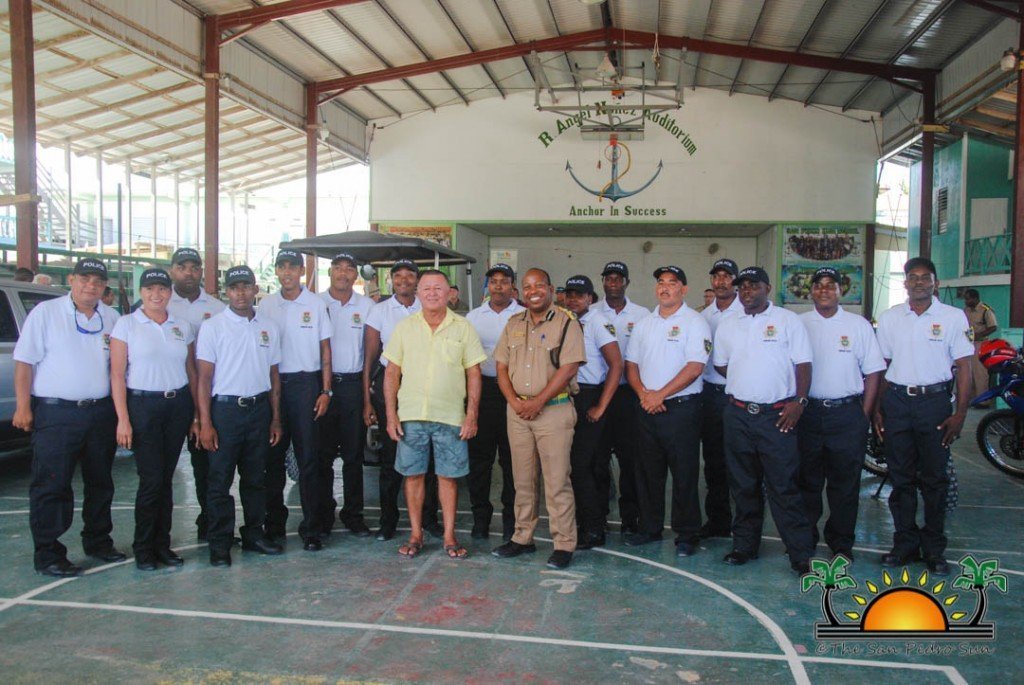
Related Articles
- National News: Police Department introduces new measure to tackle crime in 2020
- BTB encourages local tourism via the Belizean Traveller campaign
- Equipment Donated to Tourism Police Unit
- San Pedro Tourist Police Unit now have PADI Certified Officers
- BTB Donates Motorcycles To Tourism Police Unit (TPU)
- The SPTGA donates to Tourism Police and SP Lions
- Angel Nuñez Auditorium
- Belize Police department
- Belize Tourism Board
- Coastal Executive Unit
- Commissioner of Police (ComPol) Chester Williams
- North Ambergris Caye Neighbourhood Watch
- Raphael Martinez
- Rob Eckelbesh
- Superintendent Christopher Noble
- Tourism Police Unit
Nassau Grouper season opens in Belize
Sptc creating and rehabilitating streets in developing areas, hol chan marine reserve begins monitoring seasonal sea turtle nesting sites, participate learning invites belizean teachers to apply and teach in the usa, councilor dianeli aranda’s foodbank program continues, please help support local journalism in belize.
You can contact us at: #63 Barrier Reef Drive, San Pedro, Ambergris Caye, Belize Tel: 011-501-226-2070 WhatsApp: +501-611-1947 E-mail: [email protected]
Support Local Journalism
For the first time in the history of the island’s community newspaper, The San Pedro Sun is appealing to their thousands of readers to help support the paper during the COVID-19 pandemic. Since 1991 we have tirelessly provided vital local and national news. Now, more than ever, our community depends on us for trustworthy reporting, but our hard work comes with a cost. We need your support to keep delivering the news you rely on each and every day. Every reader contribution, however big or small, is so valuable. Please support us by making a contribution. Click to Donate
- Community and Society 5419
- Government 1591
- Sports 1422
- Health 1154
- Environment 1108
- Business & Economy 901
- Education 752
© San Pedro Sun

- Previous: Public Health Department
- Next: Traffic Department
Tourism Unit
The unit is a nontraditional extension of the Council organizational structure, which has been working aggressively to promote and sustain an environment that encourages the growth of the Tourism industry in the City. With the City being the main port of entry for Cruise Tourism, newly created opportunities are surfacing which call for entrepreneurial activity, and which can significantly increase the level of commercial activity in the City.
The Council's Tourism Unit works very closely with the Belize Tourism Board (BTB) which is the organization that concentrates on tourism on a national level. The Council's Tourism Unit's primary responsibilities include: the monitoring of vendors and various operations that occur within the fort Street Tourism Area, communicating with the Tourism Police Unit to address the safety of visitors and vendors in the area, and working with the Belize tourism Board to continuously assess and develop the City's Tourism Industry.
Persons that would like to find out more information about services that are offered by the Tourism Unit may contact our office at telephone (501) 227-7205.
- Tourism Councillor: Stephanne Hamilton
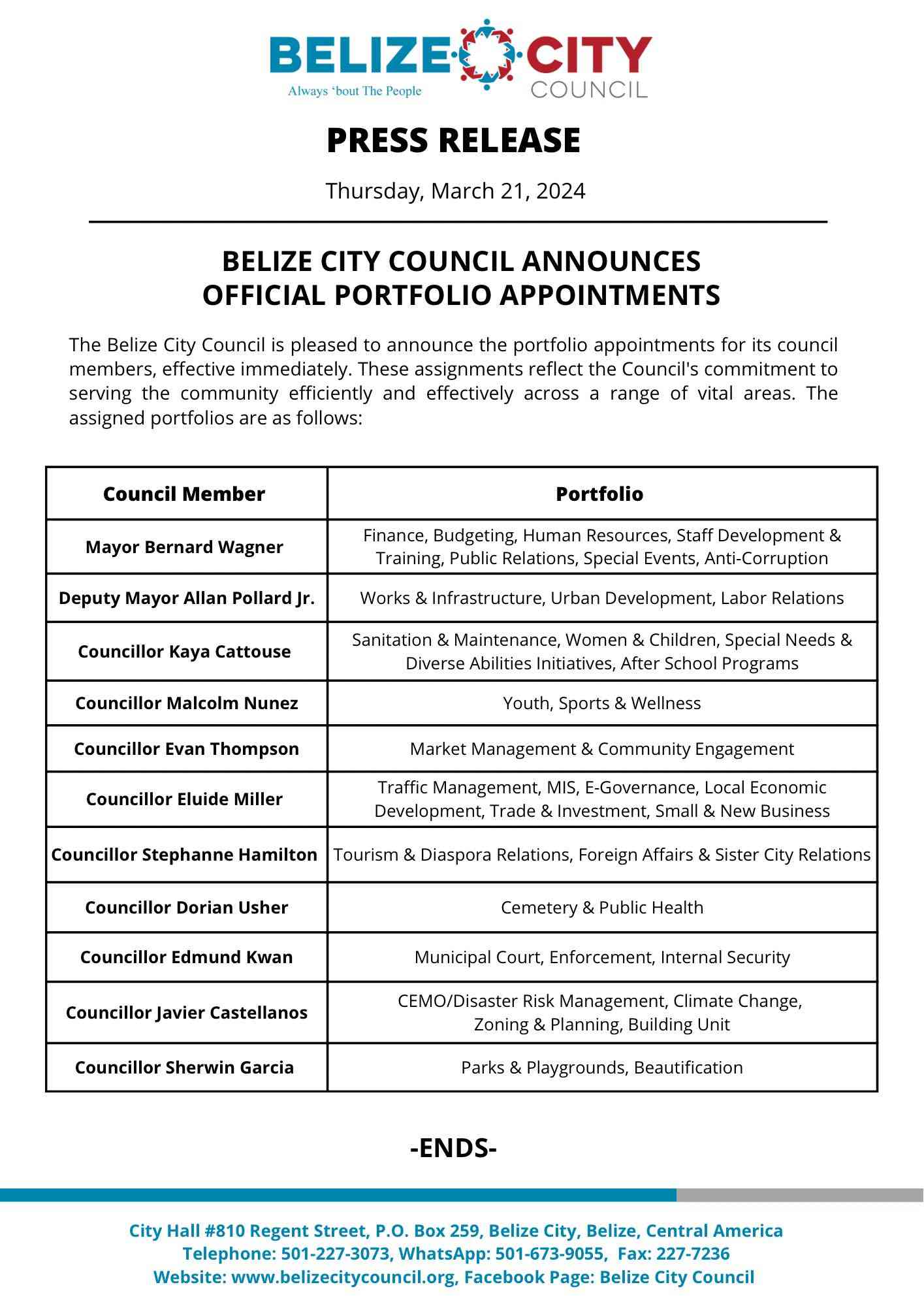
The Belize City Council
To revitalize the city by serving its people with enthusiasm, transparency, and efficiency.

Department Links
- Audit Department
- Enforcement Department
- Parks and Playgrounds
- Cemetery Department
- Programs Department
- Valuation Department
- Sanitation Department
On Social Media:
810 Regent Street, Belize City, Belize
+501-280-2308, +501-280-3073, +501-227-3073
Monday To Thursday - 8:00am To 5:00pm Friday - 8:00 To 4:30pm
Copyright Belize City Council. All Rights Reserved. | Privacy Policy
- Master Plan
- General Information
- City Council Members
- Meet The Team
- Financial Report
- Meeting Minutes
- Council Act
- Bulletin Board
- Online Payments
- Request Permits
- Departments
- Diaspora Desk

IMAGES
COMMENTS
The National Travel and Tourism Strategy, launched in 2012, was created to draw 100 million international visitors to the U.S. by 2021 with hopes of having them spend $250 billion annually. And that's just international visitors. Your fellow Americans are also traveling to U.S. tourist sites and opening wide their wallets. Law enforcement ...
One of the key features of post-modern police systems is a move towards specialist police units, targeting specific offences, victim groups, offenders or a combination of all three. ... Specialist tourist police units are a recent development in many countries where tourism is important to the economy and where crimes associated with tourism ...
A Police Tourism Safety Unit can help enhance the reputation of a tourist destination by ensuring that tourists feel safe and comfortable while visiting. In 2022, Egypt had 11.7 million tourists. If tourist security is effective, it can be a powerful marketing tool to attract people to your hotels, destinations, or communities. ...
According to a June 4, 2018 article in the Tennessean newspaper, the Nashville Convention and Visitors Corp provides its city police department with an annual grant of $100,000 to ensure tourist safety, and also pays for police overtime at special events. In Nevada, the Las Vegas Convention and Visitors Authority funds an analyst at the Las ...
Despite the announcement that a force of 100 so-called tourist police would begin monitoring Moscow's most iconic destinations on Tuesday, confusion reigned among the officers patrolling Red Square.
Tourism is one of the fastest growing sectors and plays a key role for the economy of various countries. Tourism sector provides lot of opportunities and challenges to its stakeholders. Tourist's safety and security plays a vital role to increase the tourists to a location. Tourism policing plays an essential role to build destination image.
For this purpose, the Tourist Police Unit should be set up in order to provide safety and security to tourists. Any investments in tourism oriented policing will be an investment in the economic future of the destination and the country. ... There should be consensus on the necessity to introduce a separate Tourism Police Unit at least in major ...
Tourism police and security experts will need to continue to focus on the twin issues of tourism crimes and terrorism, and at the same time they will also have to pay greater attention to multiple new areas of tourism surety. ... A dedicated "tourist police unit" is being proposed to try to stem the alcohol-fuelled crime wave involving ...
Nov 2014. Jo Brayford. John Deering. View. Request PDF | Policing tourism: the emergence of specialist units | Specialist tourist police units are a recent development in many countries where ...
In this context, it is believed that tourism police help create the destination image. For this purpose, the Tourist Police Unit should be set up in order to provide safety and security to tourists. Any investments in tourism oriented policing will be an investment in the economic future of the destination and the country.
Many countries around the world rely on the tourism industry to support their economies, making the safety and protection of travelers and workers in the industry of paramount importance. However, few police departments around the world have special divisions dedicated to the protection of tourism, tourists, and tourist centers. Tourism-Oriented Policing and Protective Services is a collection ...
The Tourism Police Unit (Turkish: Turizm Polisi) was established in 1973 in İstanbul (Kumbasar, 1988, p.43). Turkish National Police employing almost 250.000 sworn police officers is one of the largest public sector organizations that prides itself on providing professional police and security services to the general public and tourists. Now ...
create a tourism-oriented policing (TOP) unit within the Tobago Police Division (TPD) (TTPS 2015: 25), which is responsible for protecting tourists. Selected and trained specifically to deal with ...
This article briefly examines some of the literature; profiles one best practice program in Anaheim, California; and concludes that partnerships between the tourism industry and law enforcement ...
Dan Rang. In 1975, the police force in the Dominican Republic instituted a special unit, especially trained, to patrol and provide security at airports and other tourist spots throughout the nation. The need for such a unit grew because of the increase in the number of tourists arriving in the country and the crime rate that arose as a result.
Crime is considered a serious deterrent for tourism in South Africa. According to the most recent national crime statistics, between October and December 2022, the police reported 7 555 murders in ...
"The Belize Tourism Board (BTB), the Hol Chan Marine Reserve (HCMR), and the Tourism Police Unit (TPU) signed a Memorandum of Understanding (MOU) to improve the tourism enforcement activities ...
The Tourist Policing Unit at the Osceola County Sheriff's Office is dedicated to protecting the most precious piece of Central Florida's economy: tourism, as the eponymous name implies.
Jan 2018. Indian Institute of Travel and Tourism Management (IITTM) (2018), Study on 'Functioning of Tourist Police in States/UTs & Documentation of Best Practices', accessed 15 January 2022 at ...
Members of the San Pedro Tour Operators Association (SPTOA) met with the Chief Executive Officer (CEO) of the Ministry of Tourism, Acting Director of the Belize Tourism Board (BTB), and head of the Tourism Police Unit on Wednesday, April 21 st, to discuss various issues relating to tour operators on the island. The government representatives listened to the issues brought up by SPTOA members ...
To make San Pedro Town safer for visitors and residents alike, the Belize Police Department added 13 new constables to the island's Tourism Police Unit (TPU) on Wednesday, August 14th at an official ceremony held at the Angel Nuñez Auditorium. They will join the current four tourism officers in San Pedro, bringing the number to a total of 17.
Tourist Police Unit Angeles City, Angeles City. 1,625 likes · 1 talking about this · 9 were here. We're your First Friend, You're Safe With Us!
The Council's Tourism Unit's primary responsibilities include: the monitoring of vendors and various operations that occur within the fort Street Tourism Area, communicating with the Tourism Police Unit to address the safety of visitors and vendors in the area, and working with the Belize tourism Board to continuously assess and develop the ...